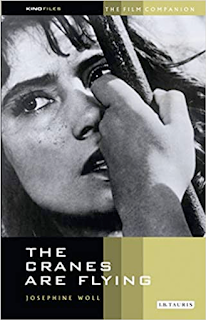As I have noted previously in these blogs, one of my hobbies and one of my scholarly interests has long involved Russia and the Soviet Union and particularly Russian and Soviet culture, literature, and film. Given this I have, over the course of my sixty plus year life, read a lot of Russian and Soviet literature and seen a lot of Soviet films and television programmes. One of my favourite Soviet films and probably my favourite World War Two or Great Patriotic War film in general, is the award winning 1957 film The Cranes are Flying directed by Mikhail Kalatozov and filmed by Sergey Urusevsky.
The Cranes are Flying, written by Russian and Soviet film studies scholar Josephine Woll (London: Tauris, Kinofiles, 2003) argues, not surprisingly, that the broader context of The Cranes are Flying, is the Thaw, that period that began with the death of Yosef Stalin and Nikita Khrushchev's famous speech criticisng Stalin at the twentieth Congress of the Communist Party in February of 1956. As Woll notes the ebbs and flows of the Thaw allowed Soviet artists a greater degree of artistic freedom relative to the Stalin era of Soviet and Russian history and it was that greater degree of artistic freedom that allowed Kalatozov and Urusevsky the freedom to tale the tell of tale of a flawed heroine in a cinematographic language that, in part, went back to the early days of Soviet cinema and which foreshadowed some of the innovative cinematic techniques of the French nouvelle vague.
In her brief monograph Woll follows a strategy that underlies the Tauris series Kinofiles in general. Woll explores the contexts, writing, production, reception, and influence of The Cranes are Flying, a strategy that makes Woll's monograph often seem like one of those film by numbers Hollywood genre films or television programmes. That said, if you are interested in poetic cinema, Soviet film, Soviet history, and the Thaw, I recommend this monograph.

No comments:
Post a Comment